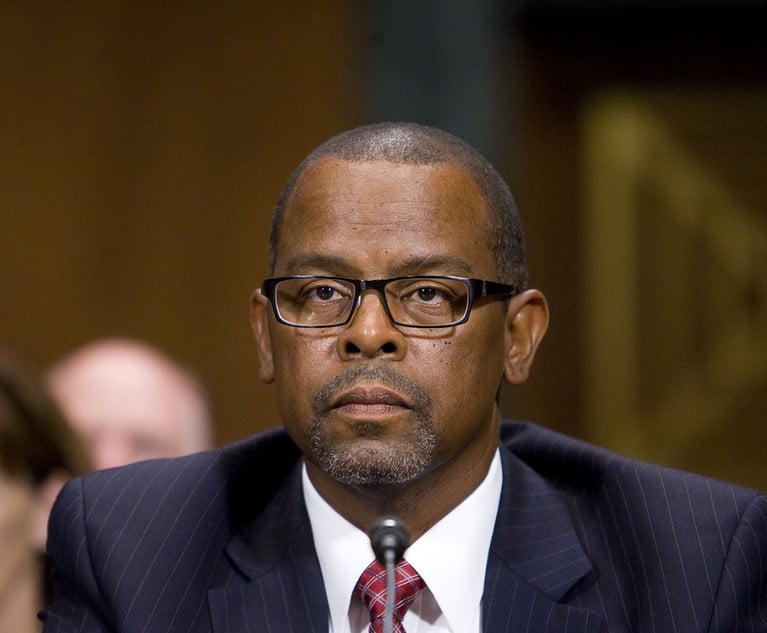 Justice Jeffrey Johnson.
Justice Jeffrey Johnson.'I Am Devastated': Embattled Appellate Justice Says Sexual Misconduct Charges Don't Warrant Removal From Office
An examiner with the enforcement arm of California's Commission of Judicial Performance, however, said that Second District Justice Jeffery Johnson has never admitted he has a problem and "there's a very real likelihood that he will again engage in misconduct."
May 07, 2020 at 06:44 PM
4 minute read
An attorney for the Commission on Judicial Performance on Thursday pressed the 11-member disciplinary panel to remove Jeffrey Johnson from the Second District Court of Appeal, arguing that the associate justice has not shown genuine remorse and remains a threat to women in the courthouse and the public.
During a videoconference proceeding, Emma Bradford, an examiner for the commission's prosecutorial arm, accused Johnson of exploiting his authority as a judge to sexually harass court employees, lawyers and colleagues on the bench over a decade. She repeated the testimony of some of the dozens of witnesses who appeared at a 17-day investigatory proceeding last year to detail allegations of Johnson appearing drunk in public, making crude, sexual remarks or groping women.
"There's a very real likelihood that he will again engage in misconduct because Justice Johnson has not and will not admit he has a problem," Bradford said.
Johnson, appearing remotely before commissioners who were tuned in from offices around the state and in the California Supreme Court chambers, has denied many of the accusations. Johnson has maintained that witnesses were swayed by the inadvertent, widespread leak of an email that described allegations made against him by his former security officer.
Thursday's hearing marked the final public airing of the charges against Johnson before the commission decides, what, if any, discipline to impose. Commissioners have a range of options from closing the case to ending Johnson's 10-year career as a state judge.
His voice quivering at times, Johnson told commissioners he has completed 150 hours of therapy and education since first learning of the allegations against him. He said he takes responsibility for making some women uncomfortable with his "friendly, outgoing nature" and "my efforts to be the same as everybody else and relate to everyone in that way."
Johnson denied physically groping fellow Justice Victoria Chaney and rejected allegations that he linked promises of career help with inappropriate touching of other women.
Johnson, who has blamed reports of him slurring speech and stumbling in public on diabetes, said he has stopped drinking to banish any perception that he has an alcohol problem.
Johnson and his attorney, Paul Meyer, said the judge's actions may be deserving of censure, but not removal from office. "I am devastated and humbled by this process," Johnson said.
A three-judge panel of special masters issued a 316-page report in January concluding that the commission's prosecution had proven most of the misconduct allegations against Johnson. The justice's ethical lapses were "compounded," the masters wrote, by his "failure to take responsibility for many of his actions."
Johnson and Meyer seized, however, on the masters' findings that examiners did not prove allegations that Johnson used sexually suggestive language with or inappropriately touched members of Johnson's security detail, California Highway Patrol Officers Tatiana Sauquillo and Shawna Davison. They also denied Chaney's allegations that Johnson inappropriately touched her breast and buttocks.
Meyer said putting those allegations aside, as well as accusations concerning events beyond six or eight years ago, the remaining misconduct charges center on "less serious social comments" made by Johnson. The attorney also noted that Johnson has been charged with prejudicial as opposed to "willful" misconduct. That, along with Johnson's lack of a disciplinary record warrants no more than a censure, Meyer argued.
Bradford said the commission is well within its authority to remove a judge for prejudicial conduct. As for some of the allegations being "less serious," Bradford said, "they were not insignificant to women at the other end."
"These women deserve a safe and respectful workplace at the Second District and they cannot have that if you allow [Johnson] to return to the bench," she said.
This content has been archived. It is available through our partners, LexisNexis® and Bloomberg Law.
To view this content, please continue to their sites.
Not a Lexis Subscriber?
Subscribe Now
Not a Bloomberg Law Subscriber?
Subscribe Now
NOT FOR REPRINT
© 2024 ALM Global, LLC, All Rights Reserved. Request academic re-use from www.copyright.com. All other uses, submit a request to [email protected]. For more information visit Asset & Logo Licensing.
You Might Like
View All

Visa CLO-Turned-Vice Chair Seeing Payoff From Expanded Role

Supreme Court allows investors' class action to proceed against microchip company Nvidia
3 minute read
‘Really Deflating’: Judges React to Biden Threat to Veto New Judgeships Bill
Trending Stories
- 1Bucking Industry Trend, Sidley Austin Elects Biggest Class of Partners in Firm History
- 2US Judge Throws Out Sale of Infowars to The Onion. But That's Not the End of the Road for Sandy Hook Families
- 3‘Really Deflating’: Judges React to Biden Threat to Veto New Judgeships Bill
- 43 Incidents Lead to Charges Against the Alexander Brothers; Cousin Remains at Large
- 5Sidley Austin Elects Biggest Combined Class of Partners and Counsel in Firm History
Who Got The Work
Michael G. Bongiorno, Andrew Scott Dulberg and Elizabeth E. Driscoll from Wilmer Cutler Pickering Hale and Dorr have stepped in to represent Symbotic Inc., an A.I.-enabled technology platform that focuses on increasing supply chain efficiency, and other defendants in a pending shareholder derivative lawsuit. The case, filed Oct. 2 in Massachusetts District Court by the Brown Law Firm on behalf of Stephen Austen, accuses certain officers and directors of misleading investors in regard to Symbotic's potential for margin growth by failing to disclose that the company was not equipped to timely deploy its systems or manage expenses through project delays. The case, assigned to U.S. District Judge Nathaniel M. Gorton, is 1:24-cv-12522, Austen v. Cohen et al.
Who Got The Work
Edmund Polubinski and Marie Killmond of Davis Polk & Wardwell have entered appearances for data platform software development company MongoDB and other defendants in a pending shareholder derivative lawsuit. The action, filed Oct. 7 in New York Southern District Court by the Brown Law Firm, accuses the company's directors and/or officers of falsely expressing confidence in the company’s restructuring of its sales incentive plan and downplaying the severity of decreases in its upfront commitments. The case is 1:24-cv-07594, Roy v. Ittycheria et al.
Who Got The Work
Amy O. Bruchs and Kurt F. Ellison of Michael Best & Friedrich have entered appearances for Epic Systems Corp. in a pending employment discrimination lawsuit. The suit was filed Sept. 7 in Wisconsin Western District Court by Levine Eisberner LLC and Siri & Glimstad on behalf of a project manager who claims that he was wrongfully terminated after applying for a religious exemption to the defendant's COVID-19 vaccine mandate. The case, assigned to U.S. Magistrate Judge Anita Marie Boor, is 3:24-cv-00630, Secker, Nathan v. Epic Systems Corporation.
Who Got The Work
David X. Sullivan, Thomas J. Finn and Gregory A. Hall from McCarter & English have entered appearances for Sunrun Installation Services in a pending civil rights lawsuit. The complaint was filed Sept. 4 in Connecticut District Court by attorney Robert M. Berke on behalf of former employee George Edward Steins, who was arrested and charged with employing an unregistered home improvement salesperson. The complaint alleges that had Sunrun informed the Connecticut Department of Consumer Protection that the plaintiff's employment had ended in 2017 and that he no longer held Sunrun's home improvement contractor license, he would not have been hit with charges, which were dismissed in May 2024. The case, assigned to U.S. District Judge Jeffrey A. Meyer, is 3:24-cv-01423, Steins v. Sunrun, Inc. et al.
Who Got The Work
Greenberg Traurig shareholder Joshua L. Raskin has entered an appearance for boohoo.com UK Ltd. in a pending patent infringement lawsuit. The suit, filed Sept. 3 in Texas Eastern District Court by Rozier Hardt McDonough on behalf of Alto Dynamics, asserts five patents related to an online shopping platform. The case, assigned to U.S. District Judge Rodney Gilstrap, is 2:24-cv-00719, Alto Dynamics, LLC v. boohoo.com UK Limited.
Featured Firms
Law Offices of Gary Martin Hays & Associates, P.C.
(470) 294-1674
Law Offices of Mark E. Salomone
(857) 444-6468
Smith & Hassler
(713) 739-1250






